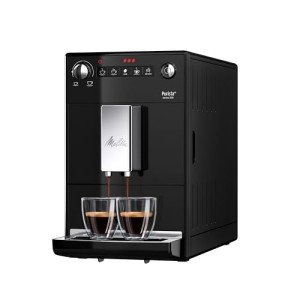Best Espresso Machines Tips From The Top In The Business

Best Espresso Machines: A Comprehensive Guide
Espresso machines have actually become a staple in coffee culture, attracting enthusiasts and casual drinkers alike. The ideal shot of espresso can elevate the coffee experience, and choosing the best machine is crucial for attaining this goal. This short article looks into the world of espresso machines, exploring a few of the very best alternatives readily available on the market today. It will cover the types of machines, crucial features to consider, a contrast table, and regularly asked questions.
Types of Espresso Machines
Before venturing into particular products, it's vital to understand the various types of espresso machines offered:
- Manual Machines: Also understood as lever machines, these need the user to manually manage the pressure and circulation of water. They use a hands-on experience but demand more skill.
- Semi-Automatic Machines: These machines automate the pressure and temperature, while allowing users to manage the shot timing. They are perfect for those who desire to take control without requiring excessive effort.
- Automatic Machines: These gadgets automate the developing procedure completely; users just pick the size and strength of the shot. Great for newbies.
- Super-Automatic Machines: This type grinds the beans, tamps, brews, and even froths milk immediately. They're outstanding for convenience, making them ideal for those who desire speed without sacrificing quality.
- Capsule Machines: Utilizing pre-packaged coffee pods, these are the easiest machines for making espresso. While convenient, they often do not have the depth of flavor found in newly ground beans.
Key Features to Consider
When searching for the very best espresso machine, a number of essential features need to direct your decision:
- Pressure: The ideal pressure for an espresso machine is 9 bars. This pressure is important for drawing out flavors effectively.
- Temperature level Control: Consistent water temperature level is crucial for a great espresso. Look for machines with PID (Proportional Integral Derivative) temperature level control.
- Construct Quality: Machines made from high-quality products tend to last longer and offer a much better experience.
- Size and Footprint: Consider your offered counter space. Some machines are compact, while others require significant area.
- Grinder Quality: A built-in grinder provides convenience, but the quality of the grinder impacts the final taste. index or doserless types alter the taste profile substantially.
- Reduce of Use and Cleaning: Consider how simple the machine is to clean and keep. Machines with removable parts normally provide simpler cleaning.
Comparison Table of Best Espresso Machines
Here's a contrast table showcasing a few of the most advised espresso machines based on numerous user reviews and professional ratings:
| Espresso Machine | Type | Pressure (Bars) | PID Control | Grinder Type | Cost Range |
|---|---|---|---|---|---|
| Breville Barista Express | Semi-Automatic | 9 | Yes | Conical burr grinder | ₤ 600 - ₤ 700 |
| De'Longhi EC155 | Manual | 15 | No | No grinder | ₤ 100 - ₤ 150 |
| Rancilio Silvia | Semi-Automatic | 9 | No | No grinder | ₤ 700 - ₤ 800 |
| Saeco Xelsis | Super-Automatic | 15 | Yes | Integrated grinder | ₤ 1,000 - ₤ 1,500 |
| Nespresso VertuoPlus | Pill | N/A | No | No grinder | ₤ 150 - ₤ 200 |
| Gaggia Classic Pro | Semi-Automatic | 9 | Yes | No grinder | ₤ 400 - ₤ 500 |
Summary of Best Espresso Machines
- For Beginners: The De'Longhi EC155 is an exceptional starting point due to its affordable price and ease of use.
- For Serious Enthusiasts: The Rancilio Silvia uses a balance in between quality and control, attracting those who wish to improve their barista abilities.
- For Convenience: The Saeco Xelsis stands apart as a top super-automatic alternative, best for users seeking optimum ease without compromising taste.
Frequently Asked Questions (FAQs)
Q1: What is the best pressure for extracting espresso?A1: The perfect pressure is 9 bars; this pressure level is ideal for extracting the tastes in espresso.
Q2: How often should I clean my espresso machine?A2: Regular cleaning is important. For machines with integrated grinders, it is best to clean them after every use. Deep cleansing must be done weekly or regular monthly depending on use and design.
Q3: Can I use regular coffee in an espresso machine?A3: Espresso is made from finely ground coffee, ideally roasted particularly for espresso. While you can use regular coffee, the taste and extraction may differ.
Q4: How long can my espresso machine last?A4: With proper care and upkeep, a high-quality espresso machine can last several years, even decades.
Q5: What grinder should I use for espresso?A5: A burr grinder is more suitable, as it provides constant grind size which is crucial for proper extraction.
The journey to finding the very best espresso machine can be an exciting one, filled with discovery and potential for developing one's coffee palate. Whether choosing the simplicity of a pill machine or the control of a manual model, understanding the different types and functions can greatly enhance the experience. With advances in innovation and innovation, there's an ideal espresso machine for all choices and ability levels on the market today. Buying the right machine not only assures terrific taste however also raises the general coffee experience.

